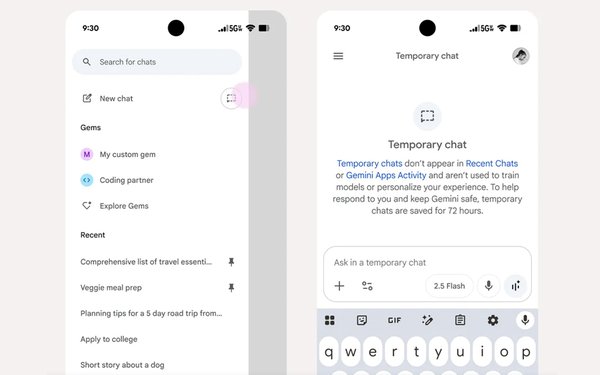
Google has introduced a Temporary Chat function for Gemini users
seeking private conversations without permanent storage or retention by the chatbot.
The feature excludes content from recent chat lists, Gemini Apps Activity records, and personalization
training data for Google's AI models.
The chats are not used to train Google’s AI models. Chats are retained for up to 72 hours only to process responses and feedback. After this
window, Google deletes all conversation data.
Temporary Chat is similar to Incognito Mode in a web browser, and allows interaction without retaining the chat history or Google's AI training
data. This feature provides users with more control of their data and privacy when using Gemini.
The chat feature responds to growing privacy awareness and concerns among AI assistant
users.
Earlier this month, OpenAI users discovered that every question asked and response given in its chatbot were potentially visible to millions in Google Search.
advertisement
advertisement
Soon after, OpenAI
removed the feature from ChatGPT that allowed users to make their conversations discoverable in search engines, despite there being a toggle requiring users to opt-in first. The question remained,
however, how many people read the fine print.
Google also restructured its approach to data management for Gemini interactions. Gemini Apps Activity is setting transitions to Keep
Activity in the coming weeks. When enabled, this setting tells Google to use uploaded content samples for service improvements across the platform ecosystem.
Files, photos, and other media
uploaded through Gemini interfaces are affected by the policy change.
Google also updated the Gemini app with a memory capability for users who want it to learn from past conversations. The
company said this feature will give users a more personal option because it can reference past chats to learn preferences and provide personalized responses.
The option enables the AI
assistant to learn and retain information to better understand the needs of the specific user, rather than just responding to a prompt in the same way it would to anyone else's, Michael Siliski,
senior director of product management at Google DeepMind, wrote in a blog post.
The system, which becomes active by default, analyzes previous conversations and identifies user preferences and
interests.
For example, when someone had previously discussed with Gemini a party they are planning, subsequent requests for themes might generate suggestions featuring those specific topics
and food recommendations.
This memory feature is not for everyone, and it is not clear how long Google will keep this information.
The personalization feature launches with Gemini 2.5
Pro model in select countries, with an expansion to the 2.5 Flash model and additional regions throughout the coming weeks.
Users will maintain control through the app's Settings menu, where
they can access "Personal context" options and toggle "Your past chats with Gemini" functionality.
Gemini's memory function extends beyond basic preference tracking because it connects
disparate conversation threads across different contexts.
Google provided an example. Let's say someone previously used Gemini to gain ideas for a YouTube channel focused on Japanese culture.
When asked for “new content ideas based on my interests,” Gemini may suggest a video theme like "'My First Time Trying ... ' where you film yourself trying a new Japanese food, a
traditional craft (like origami or a tea ceremony) or even a new game from Japan."